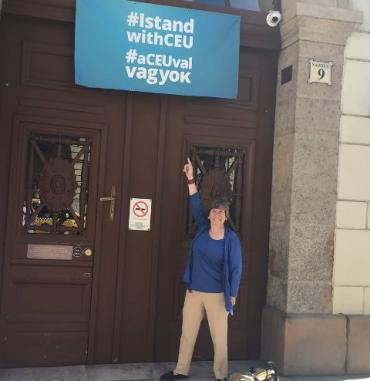AFT President Randi Weingarten joined thousands of academics across the globe in June when she paid a personal visit to Central European University, signaling solidarity with an institution the Hungarian government appears to be trying to shut down.
The Budapest university, like universities all over the United States, is a place where ideas are vigorously debated, academic thinkers explore sometimes radical ideas and students discover new ways of thinking about the world around them. But the Hungarian Parliament recently passed legislation widely seen as an attempt to stifle that activity.
With a reputation for liberal thought, CEU is a natural target for the conservative government. It was founded by Hungarian-born George Soros, a leading advocate for organizations that promote free speech, transparency, government accountability and equality. But the new law does not name political or philosophical issues. Instead, it restricts the operation of any foreign- accredited universities in Hungary by requiring that they maintain a campus in their home country; CEU has just one campus, in Budapest, though it is accredited in both Hungary and in New York.
The move smacks of censure, and academics in Hungary and across the globe are protesting what they frame as an attack on academic freedom. Some reason that it could set a precedent and eventually threaten other American universities abroad, squelching open discussion and academic inquiry.
"I write to express our shock at the newly signed law that threatens the status of Central European University," Weingarten wrote in a May letter to Hungarian Prime Minister Viktor Orbán. "The law challenges academic freedom in teaching and research at CEU, and our members strongly believe it to be a targeted effort to stigmatize and ultimately end the work of the university. This action has already had serious negative implications for Hungarian society in the eyes of scholars and human rights defenders and worldwide."
In an earlier letter to CEU President Michael Ignatieff, Weingarten expressed unyielding solidarity, decrying "political attacks against the university" as "an indefensible blow against the values of intellectual inquiry that we all share as democratic nations." During her visit to CEU, she personally assured Ignatieff that the AFT would do everything it could to advocate for the school, for political openness and democracy, and for academic freedom writ large.
The AFT's executive council passed a resolution of support for CEU and pledged to work with Education International and its affiliates in Hungary to demand repeal of the "irrational and dangerous legislation targeting CEU."
CEU, which currently serves some 1,400 students with English-based graduate study in a variety of fields, will remain open for the 2017-18 academic year, but students have been left to wonder what lies ahead. Administrators are exploring arrangements with the state government of New York that might allow CEU to remain open in Budapest.
[Virginia Myers]

